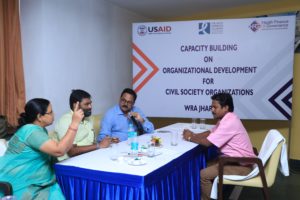Bridging capacity gaps: HFG holds civil society organizations training in India
Categories: Announcements, Where We Work

Role Play on Leadership Styles (Jharkhand)
Bolstering the organizational capacity of civil society organizations (CSOs) working with communities on family planning, maternal and child health, and social accountability issues has formed a major part of the Health Finance and Governance (HFG) project’s work in India over the past year. Working with the White Ribbon Alliance of India (WRAI), HFG is supporting a total of 26 CSOs — 15 from the state of Jharkhand and 11 from Rajasthan — that are all part of the WRAI network.
HFG recently concluded five-day training workshops for the CSOs from the two states. The Jharkhand workshop was conducted in July in two parts: one held from July 11–12 and the other from July 19–21. The HFG team rigorously deliberated on the lessons and feedback from this workshop to further refine the training content and delivery mechanism. The five-day training workshop for the Rajasthan CSOs was held during September 4–8. The training included knowledge sharing, skill building, and practice sessions on a broad range of organizational development themes. The training program, content, and resources were designed based on the CSOs’ capacity gaps and needs, which had been ascertained earlier through an organizational capacity assessment exercise. The training content as well as the resource kit material was bilingual, produced and delivered in both English and Hindi.

Discussion on Communication and Messaging (Rajasthan)
Senior functionaries from each CSO, including its program head, chairperson/secretary, and finance department head, attended the training. The total number of training participants from the two states stood at 81 — 45 from Jharkhand and 36 from Rajasthan. The major areas covered by the training included leadership, financial management, human resource management, strategic planning, fundraising, and communications. The interactive training format involved regular group practice sessions, which allowed participants to share their experiences and discuss how lessons learned from the training could be applied at their organizations.
Great enthusiasm and resolve to implement the learning was visible among the participants, who saw in it tremendous value for ensuring the effectiveness and sustainability of their organizations and work. The sentiment is captured well in the words of Laxman Singh, Founder and Secretary at Gram Vikas Navyuvak Mandal Lapodia, Rajasthan:
“I will be going back to my organization with a lot of new learning and ideas. This knowledge will definitely help my organization move forward and strengthen its activities toward promotion of health, community voice, and accountability. I am convinced that if we can address the core issues that weaken our organizations and their work in the community, we will be taking the first steps toward creating a new India.” The enthusiasm and optimism mirrored in the words of Sanjeev Bhagat, Secretary, Lok Kalyan Seva Kendra, Jharkhand: “What we have learned is like bricks, cement, mortar that will make our home, our organization, strong…We are feeling empowered and strengthened.”
The WRAI state leadership in both Jharkhand and Rajasthan was deeply appreciative of HFG’s initiative. Smita Bajpai, Rajasthan State Head for WRAI and Project Director at the NGO Centre for Health, Education, Training and Nutrition Awareness (CHETNA), complimented HFG:
“for organizing an immensely useful training and facilitating open exchange of experiences, expertise, and knowledge…The training not only enriched every participant but also set the tone for more such collaborative learning and growth going forward.” A similar sentiment was expressed by Sanjay Kumar Paul, Jharkhand State Head for WRAI, who considered the training workshop “…the beginning of next steps, not only for the trained organizations but also for the state…the trained CSOs could emerge as champions for stronger service delivery and community empowerment in the state.”
The training workshop ended with each participating CSO formulating an action plan on the corrective activities it planned to implement in the short term. The potential on-the-ground impact of HFG’s capacity building support is huge, given the large reach of many of the supported CSOs; for example, Ekjut, one of the participating CSOs from Jharkhand, has a pan-state reach, covering a population of about 33 million.
HFG India interviewed Sanjay Kumar Paul, the Jharkhand state head for WRAI, to discuss the role of CSOs, their challenges, and the likely impact of HFG’s capacity building support.
HFG India interviewed Abha, Program Manager – Gram Jyoti, a CSO based in Deoghar district of Jharkhand state, to discuss the value of CSOs and how the capacity building support can contribute to efficiency and sustainability of these organizations.



